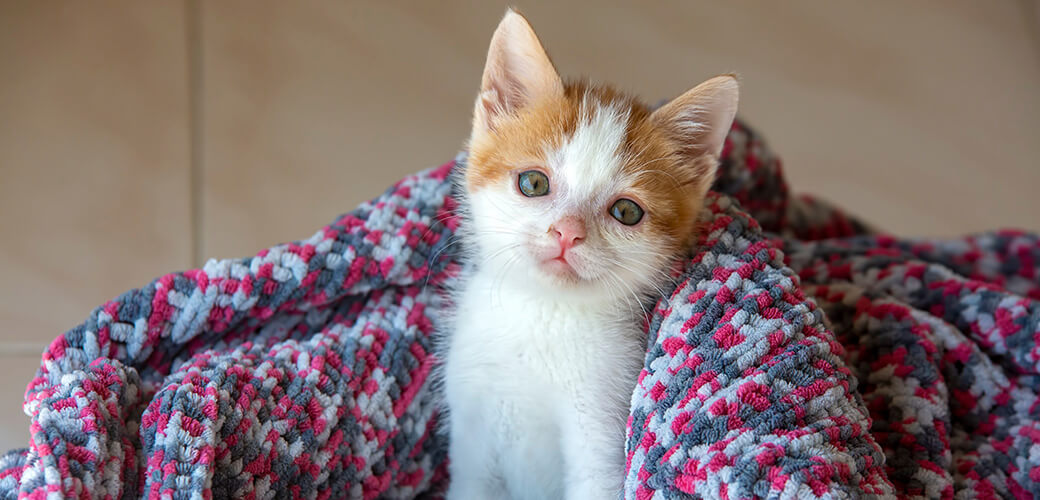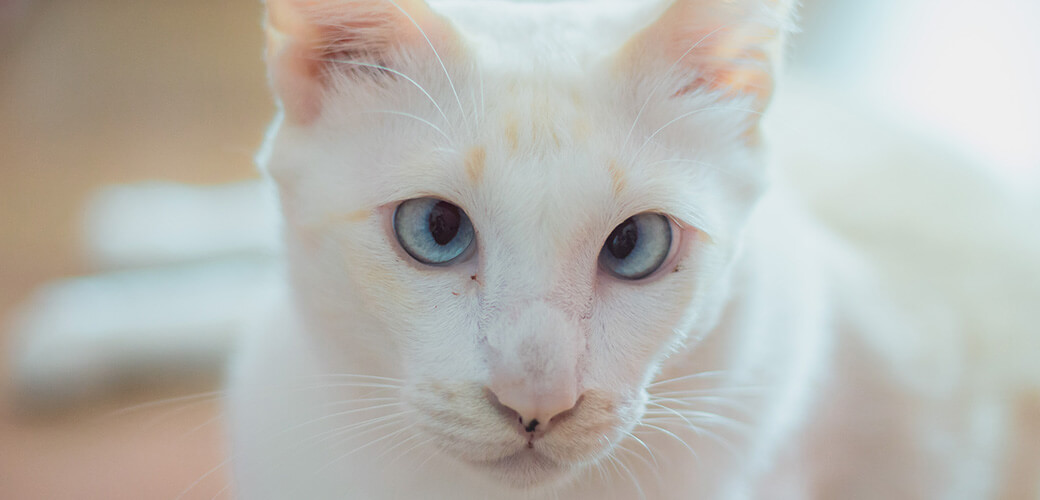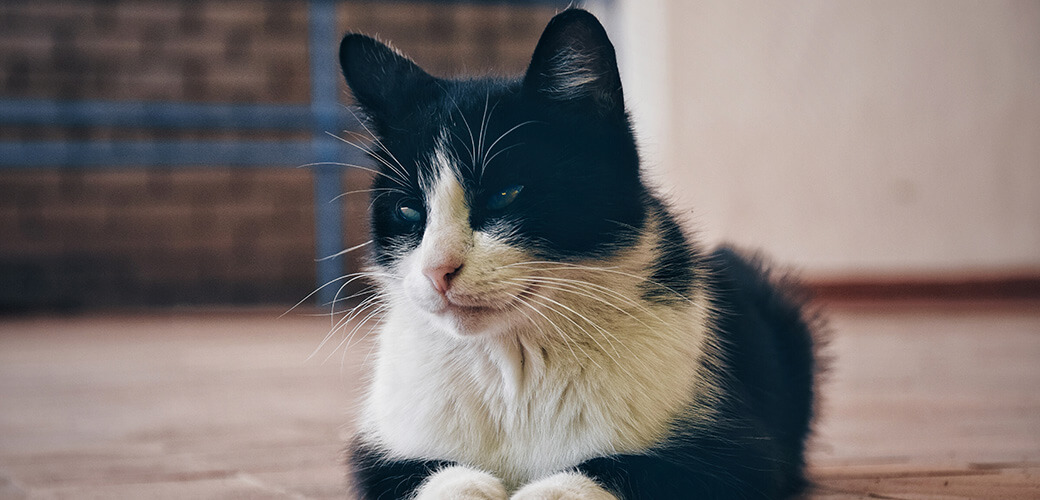Because humans tend to identify things visually, we often relate images to things we’ve seen before. There once was a cat called Monty, an internet sensation with fans who thought he had Down Syndrome. That, of course, wasn’t the case. But it sparked a lot of questions and research on the subject from pet parents who were eager to know if cats could have DS. This guide looks at conditions with similar symptoms often mistaken for the non-existent Feline Down Syndrome.
What is Feline Down Syndrome?
Feline Down Syndrome, as a recognizable condition in domestic cats, does not exist. Due to a cat’s genetic structure, it’s impossible for them to develop true Down Syndrome. This is because cats only have 19 chromosomes, and Down Syndrome affects Chromosome 21.
They can, however, develop other medical conditions that look like Down Syndrome to their human parents. These conditions mimic the symptoms of Down syndrome that we recognize from the media or information we gather online. Hence, people often assume that cats have Down Syndrome when they act or look a certain way, even though it’s genetically impossible for them to carry the condition. Because this knowledge isn’t common, we hope that this guide to Down Syndrome-like symptoms in cats can help more pet parents understand what conditions their cat exhibits.
How Does Down Syndrome Affect Cats?

As stated, cats can’t have true Down Syndrome but can have conditions with similar symptoms and effects. Down Syndrome-like symptoms in cats can affect their everyday life and give them various health problems.
The idea that cats can have DS (Down Syndrome) comes from two famous internet cats – Monty the cat and Grumpy cat. Both were born with certain features and traits that people related to Down Syndrome, and the question was born: Can cats have Down Syndrome? This is quickly answered because no, they can’t, but they can be born with facial structure issues, health problems, and other physical and mental traits that look similar to us.
A cat with these symptoms will still be able to live a full life, but they may not display the same behaviors that other cats do or look the way other cats of their type do. Each cat is unique, so there’s no one-size-fits-all for how a health condition affects them.
If you’re concerned that your pet may have a health condition affecting their quality of life, it’s vital that you schedule a vet visit. Not all conditions are identified during the kitten’s early life; some may develop later on or be caused by an injury or illness.
Signs of Down Syndrome in cats (related symptoms that look like Down Syndrome)
- Mild to moderate mental disabilities
- Decreased muscle tone
- Difficulty walking
- Shorter-than-average height
- Upturned, large eyes
- Small or oddly-shaped ears
- Loss of hearing
- Loss of vision
- Broad noses
- Heart problems
- The obvious difference in facial structure when compared to cats of the same breed
- Digestive issues
- Difficulty eating food
Even though cats can’t get the Chromosomal abnormalities that give humans DS, they have their own breed-specific Chromosome condition that affects male cats and gives them Calico or Tortoise-shell coat coloring. Male cats with these colorations are extremely rare and only happen because they carry an extra Chromosome that they shouldn’t have.
How Do Cats Get Down Syndrome?
Though cats can’t get DS, we’re sure you’re interested to know where the similar symptoms come from.
Down Syndrome-like symptoms in cats usually indicate that something happened while they were inside the womb during the mother cat’s pregnancy. Whatever happened affected the regular development of the healthy kitten, giving them the symptoms you’re associating with the human Down Syndrome condition.
There is the Panleukopenia Virus, for example. If a kitten in utero is infected with this virus, it can cause several abnormalities that we associate with the DS condition. These include poor haircoat quality, weight loss, poor appetite, collapse and bruising of the skin, and digestive issues, among others.
Other infections can also happen in utero, as well as issues if the mother cat is exposed to toxins while pregnant. These aren’t the only ways for kittens to have DS-like symptoms, but it’s good for cat owners to know that many symptoms are born of conditions that happen early in the kitten’s life cycle.
Can you test for Down Syndrome in cats?
Because DS doesn’t exist in cats, you’re likely to want to try and test for the other conditions that your pregnant cat’s kittens may have. Some infections can be passed from mother to kitten, so these will be identified when the mother cat gets sick, and your vet can advise you whether the kittens will be affected.
Other potential conditions to note are Distal Polyneuropathy, Feline Dysautonomia, and Cerebellar Hypoplasia. If you see a condition called Feline Distemper, this is caused by the Panleukopenia virus that we mentioned earlier.
How Common is Down Syndrome in Cats?

Having Down Syndrome-like symptoms in felines isn’t common at all. Most cats are born without abnormalities, illnesses, or conditions that need further treatment.
Unless a condition is genetic – meaning it will be passed on through the DNA of the mother or father cat, the kittens, most symptoms that mimic DS come from viruses caught in utero or genetic disorders. If your cat just isn’t eating well, but there’s nothing physically abnormal, you shouldn’t jump to the conclusion that they have a serious illness or medical condition. Always consult your vet.
What Other Conditions Cause Down Syndrome Symptoms in Cats?
- Cerebellar Hypoplasia
- Distal Polyneuropathy
- Feline Dysautonomia
- Feline Panleukopenia
- Head trauma
- Klinefelther Syndrome
- Malnutrition
Which Cat Breeds are More Likely to Have Down Syndrome-Like Conditions?
With this kind of question, it’s best to look at cats prone to any genetic or inherited disorder. These disorders are likely to cause some symptoms on the list of physical and behavioral abnormalities for conditions like DS.
- Bengal cats
- Burmese cats
- Himalayan cats
- Lykoi cats
- Persian cats
- Siamese cats
The life expectancy of cats with Down Syndrome-like conditions
The life expectancy of a cat with any disorders or conditions named in this guide will vary. Kittens can quickly succumb to infections and viruses if they aren’t treated fast enough – and even quick action can’t always save them.
Grumpy Cat, a famous internet cat thought to have Down Syndrome (though she had feline dwarfism and an underbite that caused her appearance), lived to be 7 years old. She passed due to complications from a urinary tract infection.
But even a cat with Cerebellar Hypoplasia can live a normal life without affecting their lifespan if they are cared for correctly and have no other underlying conditions. Cats have the ability to overcome many things, even trauma to the head, as long as they have the support, they need when adjusting their routine.
Do Cats with Down Syndrome Need a Special Diet?

Many genetic disorders in cats will lead to issues with their motor skills – such as clumsy or unbalanced walking. A fair amount of feline medical conditions include hip dysplasia as a symptom because the joints of domestic cats are vulnerable to many things. If your cat struggles with walking and has sore joints, you may wish to switch them to special cat food that includes joint supplements and omega fatty acids for their health. Though there are no Down Syndrome cats, many other feline medical conditions with mental, physical, and behavioral traits may benefit from certain types of diets.
It’s best to seek advice from your vet in this case because they will know if the medical condition your cat has will improve with changes to their diet. As DS in cats doesn’t exist, changing their food wouldn’t be helpful until you know what they have.
Frequently Asked Questions:
Q: Can cats have Down’s syndrome?
A: Feline Down Syndrome is not a condition cats can have. DS affects the 21st Chromosome set, and cats only have 19 sets. Many cats who have issues with their motor skills, suffer from unbalanced walking, or have other neurological abnormalities could have any of several other feline medical conditions, but DS is not one of them. There are other genetic abnormalities and birth defects that pet parents should consider if they think their cat has a rare chromosomal abnormality.
Q: What causes feline Down syndrome-like symptoms?
A: There is a section in this guide that lists several conditions with symptoms that match those of DS. This is not exhaustive, as there are many possible neurological problems and conditions that felines can be born with, gain as a result of trauma, or develop as they age. Some conditions are related to their breed, and some can be gained in utero or at a young age.
Q: How do I know if my cat is mentally disabled?
A: There are some common behavioral traits that you can look out for when trying to find out if your cat is mentally disabled, but it’s much more difficult to quickly diagnose when you compare it to physical disabilities or a genetic anomaly. Veterinary advice is the only way to go with a mental disability because there are fewer physical characteristics to go off of.
Q: What disease did Grumpy Cat have?
A: Grumpy Cat had feline dwarfism, which caused her small size and irregularly-sized features. She was actually a regular domestic shorthair, but the condition skewed her growth, and she also had a prominent underbite attributed to her looks.

